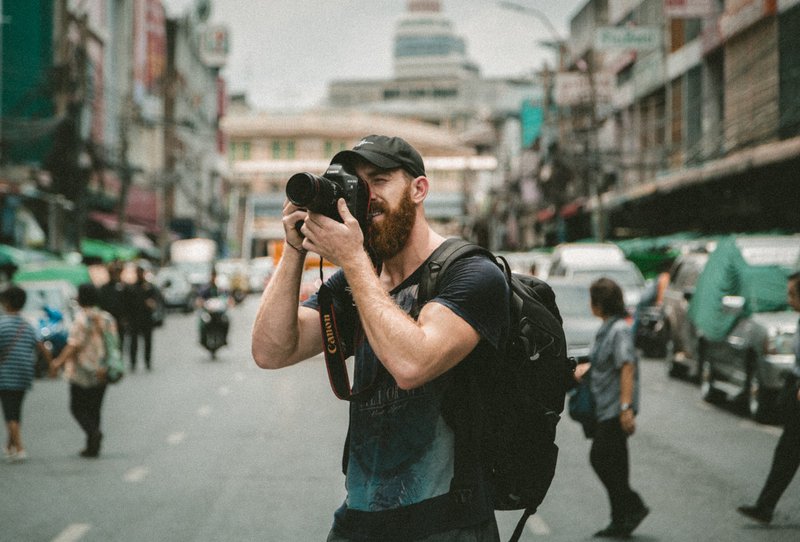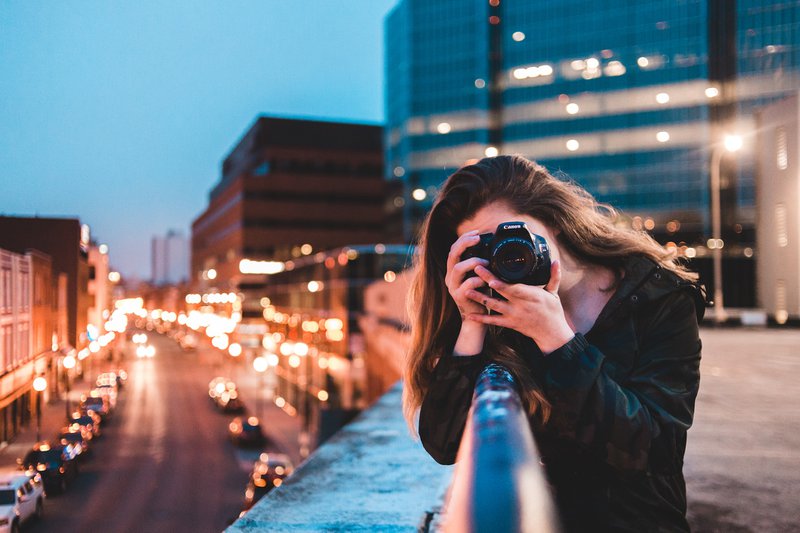Starting your own photography business can be a profitable side hustle or a rewarding full-time career!
If you love photography, already know how to use professional equipment and have a creative flair, it makes perfect sense to start your own photography business and see how much you can achieve!

Why photography business is a great one to start?
You can live your passion
Many people start their own photography business after developing photography skills as a hobby. So if you’re that person who always looks for a better angle when taking photos or always volunteers to do a photo shoot for your friends or family when they only ask for one picture, there’s no doubt there’s something about photography that you enjoy!
When you decide to turn your hobby into a business, you get to do what you love every single day. Even better, you get paid for doing it!
Running a photography business allows you to express your creativity
If you’re a creative person but are stuck in not so creative job, it can negatively affect your life and your mental health.
Starting your own photography business allows you to express your creativity. This can make you feel happier, increase your self-confidence and improve your overall wellbeing.
You can make people happy
The aim of every business is to make clients happy. But when you are a photographer, you get an amazing opportunity to capture moments that are special to clients. It could be a wedding, any other event or a new launch for a business!
If your client is satisfied with the final result you not only make them happy for that moment. They are likely to keep those photographs, so you will be making them happy every single time they look at them, even if you don’t work with that client ever again!
Also, capturing people in a way that makes them feel beautiful can really boost their confidence. This means that running a photography business isn’t only profitable for you. It also has a positive impact on your clients’ lives!

It gives you flexibility
When you start your own business, you are in charge of your schedule. This is a great option for those who have other responsibilities or those who simply don’t enjoy working 9-5!
Being a business owner means you can work full-time, part-time, weekdays, weekends, mornings, evenings or simply said, whenever it’s best for you!
What skills and qualifications do you need to start a photography business?
As long as you have a good eye for photography and understand the technical side of taking photographs, there are no qualifications legally required to start a photography business.
However, if you have learnt how to use all the equipment yourself and never had any professional training, it might be a great idea to improve your skills and show your potential clients that they can trust you by taking a photography course. Doing a university degree can be costly and time-consuming, which means it’s not for everyone. But there are different options such as online training, short and relatively cheap courses as well as a few day workshops that focus on specific types of photography.
Another way to prove your competency is to build your portfolio even before you start your business. If you want to focus on people photography, ask your family and friends to be your models. If you are into product photography, take some creative photos of any products you have at home! This could be a can of lemonade, a book or something as little as a pen.
When building your portfolio, try to show that you are flexible and can fulfil different requests. At the same time, try to show your own personal style and what makes you stand out from other photographers.
Also, it’s important to note, that to start a photography business, photography knowledge isn’t enough. Being a business owner comes with many different responsibilities. This means you need to understand things like bookkeeping, marketing and copyright as well as have very important skills such as time-management, decision making and communication skills.

Steps to setting up a photography business
Choose you niche
Think about what you enjoy the most and what your strengths and weaknesses are.
If you have excellent communication skills and people feel comfortable when you are taking pictures of them, people or portrait photography might be the best option for you. Not everyone that comes for a photoshoot knows how to pose. To get the best shots you need to communicate with your models and make them feel relaxed, so the poses look natural.
If you always manage to get the best candid shots, then you might want to consider event photography.
And if you prefer to shoot something else other than people, you can choose product, travel or wildlife photography.
Also, these days, there are photographers that offer specialist services, such as pet portraiture or themed photoshoots for children where they can become their favourite characters such as fairies or superheroes.
But why is niche important?
If you enjoy more than one photography field, you might be thinking you can work on many different projects and earn even more money. However, when you focus on one niche, it’s easier to build your brand and market it to the right audience.
Write a photography business plan
A business plan is an essential document that helps turn an idea into an actual business. It guides you through every stage of setting up and running as it outlines what you need to do in order to successfully launch and grow your business.
A well-written business plan can also help you secure funding, attract great employees and prepare for future scenarios.
Writing a business plan isn’t a one day job. It contains many different sections you need to complete, including market research, competitor analysis, sales forecast, your own knowledge and experience and more.
Once you have your business plan written, you will know how your business fits in the market, how many competitors you have and how you stand out from them as well as how you are going to market your new business.
Learn what exactly goes into a business plan and how to write it yourself here.
Work out your costs and find funding
Starting a photography business isn’t always cheap. If you don’t have any equipment, getting things like cameras, lighting kits and editing software can cost thousands of pounds. You also need to think about whether you will be working from home or renting a studio.
After working out how much money you need to start your photography business, you can start thinking about how you’re going to fund it. There are a number of options you can consider, including funding it with your own savings or applying for a loan.

Register your photography business
Before you start trading, you need to register your business to be legally recognised.
As the first step of registering your business, you need to choose a legal structure that fits your business. The options are registering as a sole trader, limited company or partnership. The process of registering depends on the type of your business.
Learn more about how to register your business here.
Choose your prices
There are many different factors that can affect the prices you charge.
The fees vary according to the nature of work – whether it’s a wedding, commercial project or a personal photoshoot.
For example, commercial photographers charge from around £85 to £195 per hour or from around £675 to £1,500 a day.
The prices also depend on the experience of the photographer, the number of pictures provided and the location. You can charge extra for travelling and hotel accommodation when photographing events.
Things to be aware of when starting your own photography business
Running a business from home
Even though running a business from home sounds easy, there are a few legal requirements you need to be aware of.
If you’re renting, running a business from the property might be prohibited under the terms of your tenancy agreement. Even if it’s not mentioned, you still need to get permission from your landlord. And if you have a mortgage, you might need to get permission from your mortgage provider.
Running a business from home might also affect your tax. If you dedicate a part of your home exclusively for business purposes, you will need to pay business rates on that part of the property (read more below). Also, if you ever decide to sell it, you’ll have to pay capital gains tax on that part.
Another thing you might want to think about is insurance. Even if you have home insurance, it’s very unlikely that it would cover business activities. So if you decide to run your business from home, you’ll need to insure your equipment against theft or damage.
Business rates
No matter if you trade from a commercial property or work from home, you need to be aware of business rates.
Business rates, also known as non-domestic rates, are a tax paid on business properties. It works very similar to council tax. It’s an annual bill issued on the 1st of April for the year ahead. It can be paid in full or by monthly instalments. The money collected contributes to the cost of services, such as police, education and housing provided by local authorities.
If you work from home, you might need to pay business rates too. But this will only apply if you use part of your home exclusively for business.
For example, if you use your bedroom as a place where you edit your photos, you won’t be billed. However, if part of your property is used exclusively for business-related purposes and you have customers or staff coming in, you will have to pay.
Read more about business rates here.
Signing contracts
It’s always a good idea to sign a contract between you and your client. A contract can protect you and your business as well as your clients if there are any disagreements or disputes.
The agreement should include the description of your services, when your client will receive edited photographs and how much they are paying you. You can also include details about what your client expects from you and whether there are any additional fees, for example, for travelling or for providing more edited photos.

How to promote your photography business?
Set up your business website
A business website is essential as most people will be looking for photographers online using a simple Google search!
Don’t forget to include the most important details such as your location, descriptions of services and prices.
Another important thing you should add to your website is your up-to-date portfolio. People want to see examples of your work, what your style looks like and be able to compare it with other photographers before making a final decision on which business to choose.
Create social media accounts
A photography business is an ideal business to promote on social media! Platforms such as Instagram or Pinterest allow you to share images, so you can create a beautiful feed using your best shots. You can also use video-sharing platforms such as TikTok or YouTube to show more about your business than just the final production. This could be videos showing behind the scenes of photoshoots or sharing photography or editing tips.
We understand that attracting people to follow your new accounts can be difficult. That’s why we have created a guide on how to build your social media following from zero.
Attend (networking) events
Whether it’s industry events or networking events where you get to meet other business owners from all different industries, they are all good for making contacts and finding new clients.
For example, if you’re a wedding photographer, you can go to wedding fairs. Those fairs are targeted at those who are already planning weddings, so it’s a great place to find clients. You can go to the photography events and make connections with other photographers. Another wedding photographer might refer someone to you if they are too busy while a photographer from a different field might refer someone to you when one of their clients asks if they know any wedding photographers. And you can go to general networking events and meet other business owners who will need your services themselves or know someone who does.
If networking isn’t exactly your cup of tea, Penni has some great tips that will help you! Watch it here:
Ask for reviews and testimonials
Ask your existing clients to leave a review and share their positive thoughts about you and your business on your website and/or social media!
Reviews can be a powerful tool that attracts way more new clients than your own words praising your business. In fact, 70% of consumers trust online reviews more than advertisements created by a company while 68% of buyers are more likely to trust a local business if they read positive reviews about it.
Find out how to get a review when you’re setting up.
Disadvantages of starting your own photography business
Just like every job, starting your own photography business has its own advantages and disadvantages.
While those disadvantages mean nothing to some, others see them as a big obstacle. This is why it’s very important to be aware of them and think carefully about whether starting a business is something you truly want to do.
Unsociable working hours
While you do get an opportunity to choose your own working hours, photographers that work with events might not get a chance to be that flexible. Most events take place during weekends which means you will have to sacrifice those and work instead of spending time with your family or friends who aren’t available during working days.
You could lose your passion
Doing something as a hobby and doing it as a full-time job are two different things. When it’s only a hobby, you don’t have to worry about your photographs being professional, don’t have to deal with demanding customers and don’t have to do all the other business tasks such as bookkeeping or marketing your business.
When you turn your hobby into a business, all added responsibilities might turn the activity you love into something that stresses you out and you have to do even when you don’t feel like it.
It can be difficult to find clients
The photography market is extremely competitive.
And this is not only because of the number of photographers already trading in the UK. With technology rapidly improving, many people now have smartphones that allow them to take high-quality photos without having to use professional services.
But if you find your niche, always strive for improvement and use the right techniques to market your business, you can definitely succeed even in a crowded field such as photography! And here are some tips for attracting your first customers.
Are you ready to turn your love for photography into a successful photography business?
We have a team of dedicated business advisors that have helped start hundreds of businesses. And now they are ready to help you!
Contact us here and start your journey with us today.

